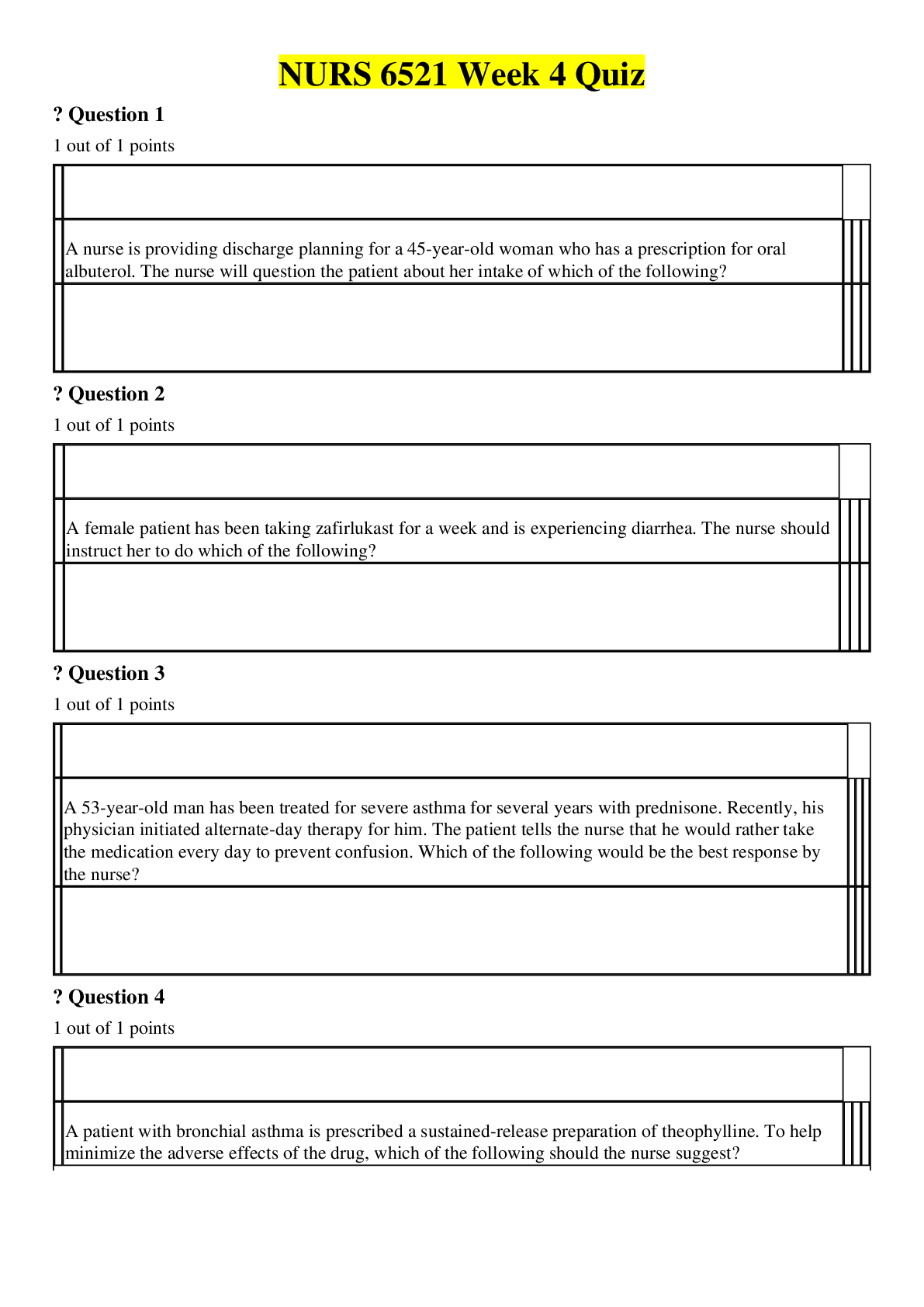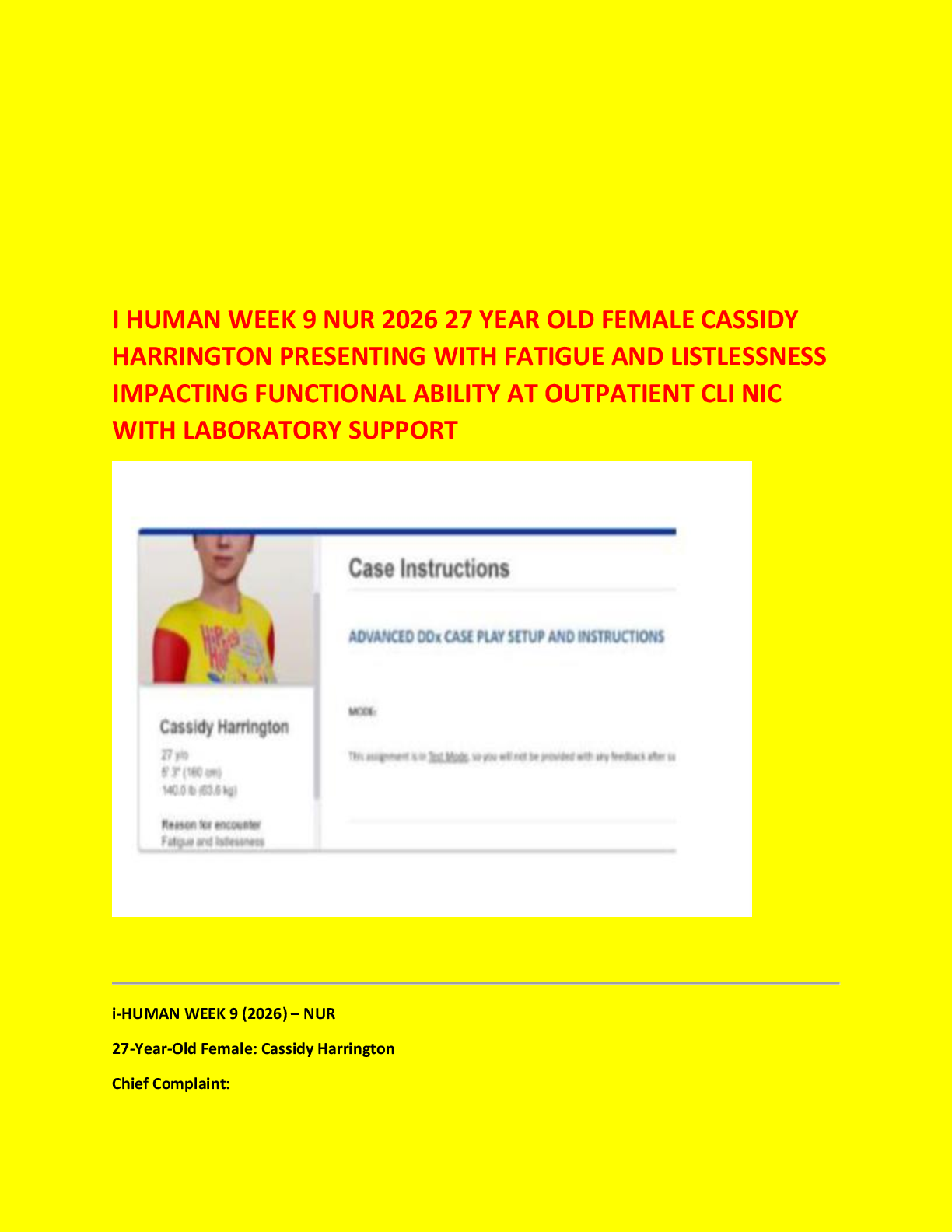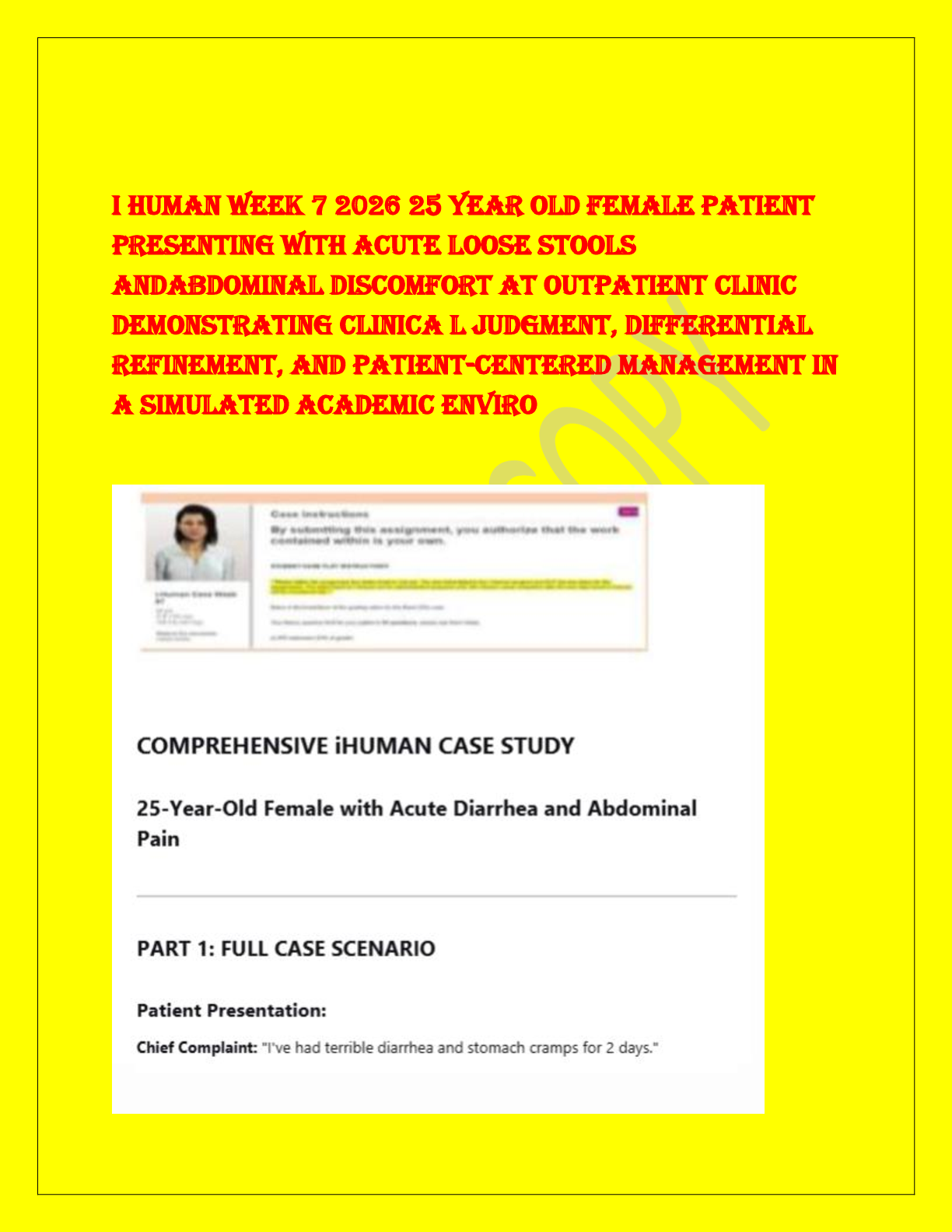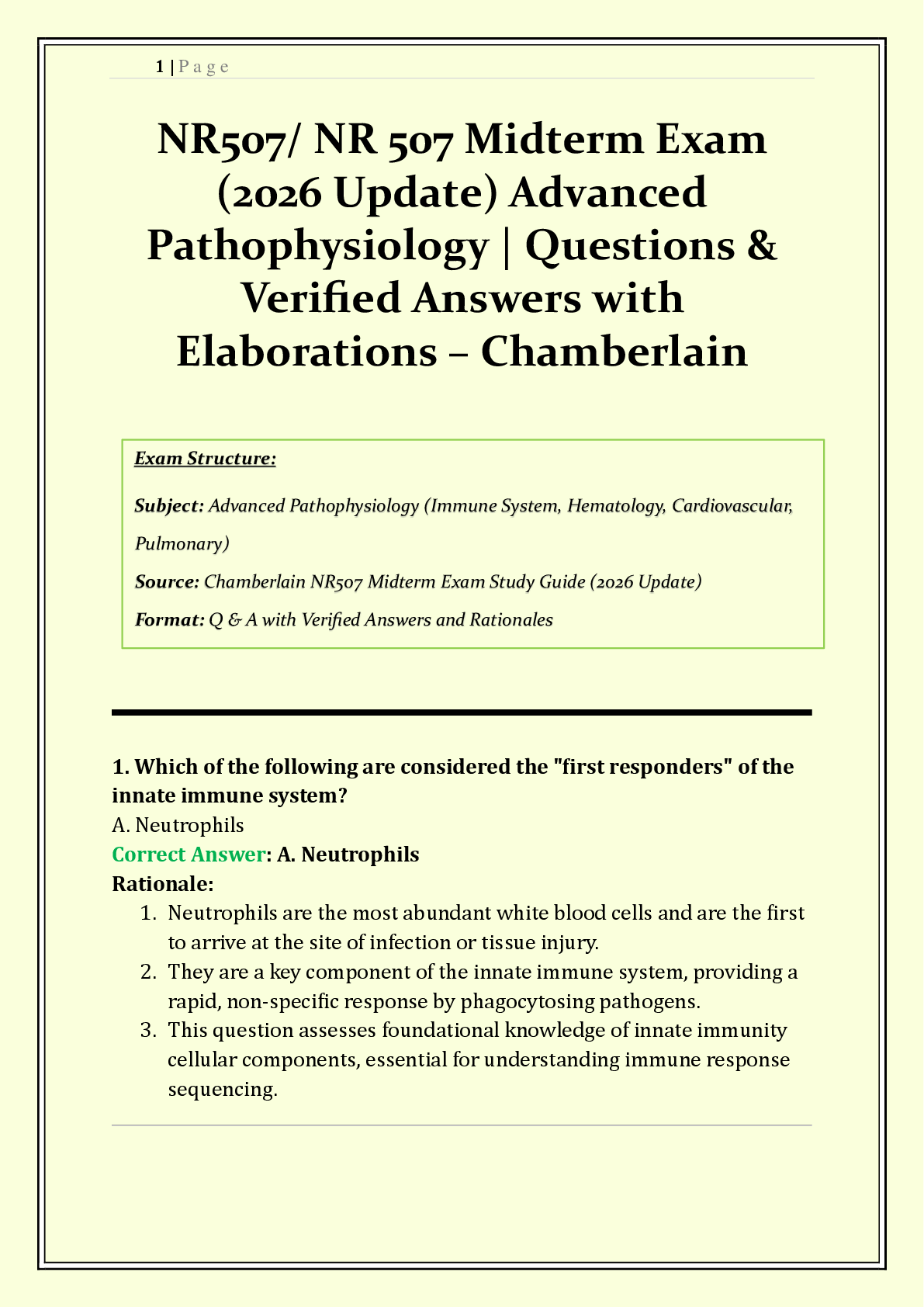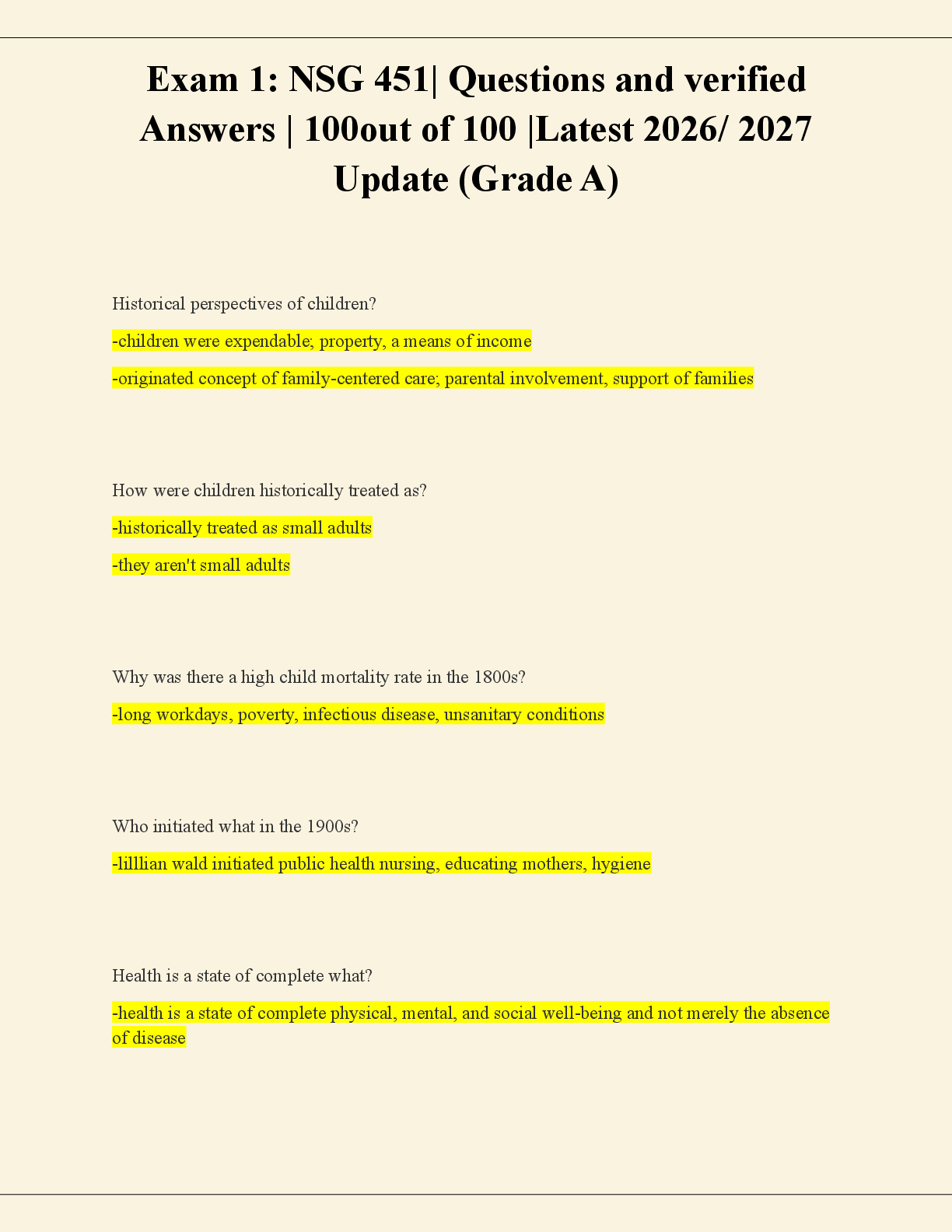NURS 6521 Week 4 Quiz 2.Q&A
• Question 1
1 out of 1 points
A nurse is providing discharge planning for a 45-year-old woman who has a prescription for oral albuterol. The nurse will question the patient about her
...
NURS 6521 Week 4 Quiz 2.Q&A
• Question 1
1 out of 1 points
A nurse is providing discharge planning for a 45-year-old woman who has a prescription for oral albuterol. The nurse will question the patient about her intake of which of the following?
Response Feedback: The nurse should assess the patient's intake of caffeine, including coffee, tea, soda, cocoa, candy, and chocolate. Caffeine has sympathomimetic effects that may increase the risk for adverse effects. Alcohol, salt, and vitamin C intake is important to assess, but does not potentiate the effects of albuterol.
• Question 2
1 out of 1 points
A female patient has been taking zafirlukast for a week and is experiencing diarrhea. The nurse should instruct her to do which of the following?
Response Feedback: The patient should be urged to drink plenty of fluids if she experiences diarrhea while taking zafirlukast, and she should report these symptoms to the health care provider. The patient should take nonnarcotic analgesics only for headaches. The patient should take the drug on an empty stomach to increase its bioavailability. It is not necessary to schedule a blood test.
• Question 3
1 out of 1 points
A 53-year-old man has been treated for severe asthma for several years with prednisone. Recently, his physician initiated alternate-day therapy for him. The patient tells the nurse that he would rather take the medication every day to prevent confusion. Which of the following would be the best response by the nurse?
Response Feedback: Alternate-day administration (medication given every other day instead of daily) of long-term, systemic glucocorticoids has been used to lessen the suppression of the hypothalamus, the anterior pituitary, and the rate of bone loss. The nurse will want to stress that the change from daily to alternate-day administration does not occur abruptly, because an abrupt change may cause signs and symptoms of adrenal insufficiency such as fatigue, nausea, vomiting, and hypotension on the days between doses. The alternate-day scheduling should decrease the cost of the medication and could help decrease the retention of fluid, which could result in a slight decrease in weight. The patient is afraid that this scheduling could cause him to be confused on which day he should take his medication, so it probably is not going to be more convenient for him.
• Question 4
1 out of 1 points
A patient with bronchial asthma is prescribed a sustained-release preparation of theophylline. To help minimize the adverse effects of the drug, which of the following should the nurse suggest?
Response Feedback: Sustained-release preparations of theophylline should be taken on an empty stomach, 1 hour before or 2 hours after meals. Immediate-release preparations should be administered with meals to alleviate gastrointestinal distress. Foods containing xanthines, in particular caffeine, increase the effects of theophylline, but they do not help minimize the adverse effects of theophylline. Patients who smoke may require an increase in theophylline dosage of up to 50%, but increasing the dosage is not a nursing responsibility.
• Question 5
1 out of 1 points
A nurse is providing patient education to a 42-year-old man who has been prescribed dextromethorphan (Robitussin). The patient is a crane operator for a local construction company. The nurse's assessment reveals that the patient is a smoker and has diabetes. The most important safety consideration while the nurse is designing a plan of care for this patient would be the fact that he is
Response Feedback: Dextromethorphan may cause sedation, drowsiness, and impaired orientation, so it may be dangerous for the patient to operate a crane during drug therapy. The patient's age, smoking habits, and diabetes would not present a significant or immediate safety risk to the patient or others.
• Question 6
1 out of 1 points
A man who smokes one pack of cigarettes daily has been diagnosed with chronic bronchitis. He has been prescribed theophylline by his family doctor. What effect will the patient's smoking status have on the therapeutic use of theophylline?
Response Feedback: Smoking cigarettes may decrease serum theophylline levels. In fact, some patients who smoke require an increase in theophylline dosage of up to 50%. Theophylline is not associated with a risk of anaphylactoid reaction. Theophylline doses do not need to be concurrent with the use of bronchodilators.
• Question 7
1 out of 1 points
A male patient is to begin treatment for pneumonia with an albuterol (Ventolin) inhaler. The nurse will advise the patient that he will most likely experience which of the following common adverse effects of the drug?
Response Feedback: The most common adverse effects of inhaled albuterol include throat irritation, palpitations, sinus tachycardia, anxiety tremor, and increased blood pressure. Serious adverse effects such as bronchospasm, urticaria, and angioedema rarely occur. Headache, dyspepsia, and muscle cramps are frequent adverse effects of oral albuterol only.
• Question 8
1 out of 1 points
A 72-year-old man is prescribed theophylline for symptomatic relief of bronchial asthma. Which of the following findings would alert the nurse to the need for close monitoring?
Response Feedback: Older men taking theophylline should be carefully assessed for an enlarged prostate gland because this drug may lead to urinary retention in persons with prostate enlargement. These patients should be monitored closely for any prostate changes. Assessing the need for additional bronchodilation, signs of an active lung infection, and hypersensitivity to povidone would not concern the nurse related to the use of this drug.
• Question 9
1 out of 1 points
Children age 6 to 11 are recommended to start with what dosage of Allegra?
• Question 10
1 out of 1 points
A high school student was diagnosed with asthma when he was in elementary school and has become accustomed to carrying and using his “puffers”. In recent months, he has become more involved in sports and has developed a habit of administering albuterol up to 10 times daily. The nurse should teach the student that overuse of albuterol can lead to
Response Feedback: Patients who self-administer albuterol may use their MDIs more frequently than recommended. This practice can result in rebound bronchoconstriction, which may motivate the patient to increase MDI use, stimulating the cycle of rebound congestion. Overuse of albuterol is not linked to pneumonia or hepatotoxicity. Albuterol is not an anticholinergic drug.
............CONTINUED
[Show More]
